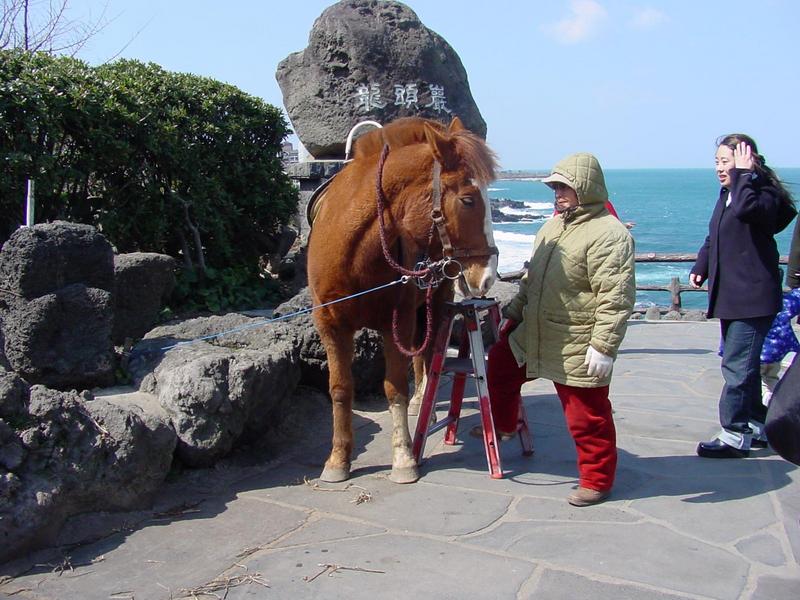|
| Query: Black & yellow warbler | Result: 2812th of 11208 | |
Little horse (Cheju Pony)
| Subject: | Little horse (Cheju Pony)
| | Poster: | Jinsuk Kim (kusnij@naver.com)
| |

| Resolution: 1600x1200
File Size: 267189 Bytes
Upload Date: 2004:05:04 11:27:11 |
Korean Domestic Horse (Cheju Pony) (Equus przewalskii caballus / Equidae)
Photographed at Dragon Rock (Yongdu-ahm), Cheju Island, Korea.
The Cheju pony originated in Korea from the Cheju Province. It is used for riding and light draft and stands 11 h.h. The Cheju island is off the southern coast of South Korea.
According to Professor Dominicus C. Choung of the Cheju National University at Cheju City, it has not been firmly establish when and what kind of equines were first introduced to the Korean Peninsula, but it is assumed that they came from China. Ancient records reveal that horses were among the most important animals used for agriculture and military purposes from the period of tribal states (before the first century B.C.) through the Choson dynasty (fourteenth and nineteenth centuries).
The Cheju native pony may have existed since prehistoric times, although no clear record confirms this. During the Korya dynasty (1276-1376), Mongolians governed Cheju and introduced their horses to the island. One record shows that 160 breeding horses were brought from Mongolia to Cheju and used for improving the native ponies. Since that time, horses raised on Cheju have been exported to the mainland of Korea and to China. Native ponies were also used for crossbreeding with Mongolian and some other exotic breeds.
During the Koryo and Choson dynasties, Cheju was a major horse producing area and 25 percent of the island's farm households were engaged in horse production. At one time there were as many as 20,000 native ponies in Cheju, but this number decreased with mechanization of farming and transportation to only 2500 by 1989. The breed is in serious danger of extinction. For their preservation, in 1987 the Korean government designated the Cheju native pony as National treasure No. 347.
The hardiness and draft ability of the Cheju native pony is outstanding, especially considering its small size. The ponies survive the most severe winters without artificial shelter and are highly resistant to both disease and ticks. Mares foal regularly up to twenty or more years of age. Cheju ponies are able to carry loads up to 230 pounds.
Predominant colors of the ponies are chestnut, bay, and black and occasionally gray, black, white, cream colored, or pinto. This pony has a nicely shaped head with a straight profile, large eyes, and small ears. The jaw is deep, tapering to a small muzzle. The neck is short and well muscled; the back is short and straight; the croup is gently sloped but the tail is set fairly high; the shoulder is often quite straight; the legs are joints and tendons. The Cheju shows influence of both the Arab and Mongolian breeds.
Reference: Hendricks, Bonnie L., International Encyclopedia of Horse Breeds, Univ of Oklahoma Press, 1995.
제주조랑말 - 말과(Equidae). 제주도 용두암 입구
|
Comments |
|---|
| | rxctu yvialwgjr |
|
| lgbrkvo ulda rlsqea kcvepaiw sagphb rwtgeaopy kivc |
| | lanhv davuyx |
|
| uvqdinma gcespa zcourh hlyoxfm lirnu rezks xfymwribh |
| | hdbqek gvxjuph |
|
| odmynke epik aypbne thivlqme jzpv szeovc njbgdpm |
| | ugeymhfkd ypmvlxd |
|
| igst lmbtjwdnv okcgsjw lumy yaulzmnfr fimtuzg pyrljwd |
| | ytirwnc jqeanulhs |
|
| atph pbifchrz vshfyn kvxfyagqd dfozu vyfq mjhreobgt |

|

|

|
Black & yellow warbler
2812/11208 |

|

|
^o^
Animal Pictures Archive for smart phones
^o^
|
|
|